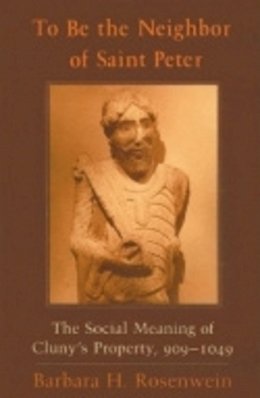Barbara H. Rosenwein is Professor of History at Loyola University, Chicago. She is the author of Negotiating Space: Power, Restraint, and Privileges of Immunity in Early Medieval Europe, editor of Anger's Past: The Social Uses of an Emotion in the Middle Ages, and coeditor of Monks and Nuns, Saints and Outcasts: Religion in Medieval Society, all from Cornell.
"The import of the title is that Cluny's property lay in a neighborhood, that is, an area with little, if any, central authority. The charters appear at first sight to be simply records of property transactions, but they are not: Rosenwein has shown they are alliances in the making, feuds being ended, and they reveal a vast network of patronage. . . . This is an important and trailblazing book well worth the effort that has gone into it."—Eric John, Catholic Historical Review "Although Rosenwein relies heavily on quantitative evidence, her clear and often polished prose style enlivens her information considerably. Her command of the scholarly literature is likewise very impressive. The author not only gives a definitive answer to some questions regarding Cluny's property but also stimulates the posing of new questions. This book shows how quantitative social history should be done."—Robert C. Figuerira, Speculum "To Be the Neighbor of Saint Peter is an important addition to the knowledge of an exemplary monastery. Rosenwein has developed new techniques for studying monastic property holdings and given a new insight into early medieval society."—John B. Freed, The Historian "Rosenwein has studied the nature of Cluny's ownership of land, the character of its claims to its property, and its tutelage of the lands of the subject houses, with the benefit of direct access to and familiarity with the resources in Dijon and Münster. She also seeks to bring to bear the methods and findings of social history and anthropology. Her book thus offers a fascinating and inviting apercu of what modern methods and resources may make possible when applied to large bodies of charter material in general and especially to the charters of Cluny."—H. E. J. Cowdrey, American Historical Review "Rosenwein . . . probes the charters and cartularies of Cluny. The results provide marvelous insights into the ways in which medieval property was conceived. . . . Rosenwein's conclusions about the social and symbolic meaning of medieval property are a healthy corrective to the anachronism that property has always been judged in narrowly economic terms."—Albert J. Schmidt, Continuity and Change "Barbara H. Rosenwein has combined research on monastic property records with new insights into the nature of medieval property and social relations. She gracefully integrates textual analysis, prosopography, and new computer techniques."—Constance B. Bouchard, University of Akron "For over a generation, the analytical techniques developed by Charles-Edmond Perrin and Georges Duby have enriched medieval social history. In To Be the Neighbor of Saint Peter, Barbara H. Rosenwein goes beyond them and shows that by asking the right questions one can know more than the institutional networks of individual lives."—Fredric L. Cheyette, Amherst College

